Riley Adams's Blog, page 148
September 17, 2013
Past Imperfect
Guest Post by James Mullen
I’ve started to sketch out the plot for
my second book. The book is a police
procedural based in Boston, and although I visit the area frequently, I haven’t
lived there in over 20 years. Computer research and phone interviews are
invaluable, you can’t beat putting your eyes on places – even if it’s just a
validation of what’s perfectly remembered.
To be honest though, I went with the idea of visiting not the actual
places I image as crime scenes, because I know them so well, but want to
re-acquaint myself with the more peripheral areas of those scenes that could
serve as description.
I plan to have the opening crime scene
take place at a downtown subway stop, or as we like to say in Boston, a “T”
stop. I’ve found most subway stations
very linear and shaped like, well, the letter “T”; ascending or descending stairs that pour out
to a waiting horizontal platform in front of the rails. Pretty straight forward, pretty simple. Since I was planning a murder, I needed a
place with more complication, more corners.
I need malevolence.
I remember a stop I used back in the
mid-70s when I commuted from the Back Bay to downtown Boston. The station always struck me as up to no
good, and on nights I worked late, felt like I was descending into a film noir
movie set. Mack the Knife or Philip
Marlowe could pop out of the shadows and stick a shiv or a gat in my back
without warning. The place defined grimy
and dark. The layout was more like the
letter “Y”, but with intricate and shadowy angles. Perfect!

So I had my hopes up when I went to
re-visit the street-level environment surrounding the stop two weeks ago. I
almost didn’t enter the stop itself since I knew the details were firmly
embedded in my memory – even 40 years later.
Boston, back then, covered both sides of
the social contract with its ridership.
The city wanted efficient use of its system, so made the environment
extremely unpleasant; searing heat in any season; zero air exchange; squealing
breaks on subways at all times; crowd movements resembling schools of fish in a
Dixie cup; most overhead light bulbs broken – illumination being supplied by
any natural light able to crawl on its hands and knees down the stairs and make
it to the platform area on the first level.
Yes, the city made good on its promise that no matter what slings and
arrows were suffered during a given workday by its citizens, they would take
place in an environment much more pleasant than the station.
But look what I walked into? As you can see from the recent photo; white
tiles on the wall! A wall, recently
cleaned! Posters, and get this, a mural
on the back wall behind the escalators.
Art appreciation! And the
lights! More than adequate ceiling
fluorescents throughout. People holding hands!
I fully expected to see folks alight from arriving subway cars singing
show tunes and then lining up for a dance routine. How could my memory do this to me? Or is it the city’s fault?
The second day I took a boat trip to
another crime scene, Spectacle Island, in Boston Harbor. Although I have never set foot on the island,
it is one of many in Boston Harbor located on a well-used flight path to and
from Logan Airport that I’ve flown numerous times. If you look out a plane’s window enough, you
get to know the landmarks and the approach well. As a precaution, I also
checked maps on the internet prior to my trip and could see that the island’s
view of the Boston skyline would be blocked by several others in the harbor;
that fact being germane to an intended plot point of my story. I give you Spectacle Island:

Lesser men would suffer boredom from
being right all the time. Me, I just
take it in stride.
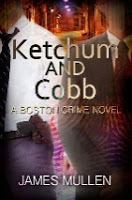
James
Mullen currently lives in North Carolina.
His first novel, Ketchum and Cobb, can be purchased on Amazon.
Website: Grumpy Gets Better (jimamullen.blogspot.com)
– things literary and not so much.
Also on
Facebook and Goodreads.
Published on September 17, 2013 21:01
September 15, 2013
When Your Work in Progress Needs Early Revisions
By
Elizabeth S. Craig, @elizabethscraig

As I mentioned last week, I recently
turned in a teaser chapter and an outline to one of my Penguin editors. This particular editor likes to see an
outline before a book is written.
The deadline for the outline was actually
Sept. 1. The deadline for the book
itself is January 1. I have a self-pub
project that I stopped working on to write this book, so I decided to go ahead
and start writing the Penguin book while I waited for feedback on the outline. There’s a bit of risk in doing so, since it
means that I might need to make big changes on a work-in-progress.
And…I did end up needing to make those
changes. The editor liked the concept
for the book, but thought the set-up in the first chapter was a bit too similar
to the one in Knot What it Seams, which
came out in February.
My editor’s memory is flawless and mine
is faulty. Although that book came out
in February, I’d written it in early 2012 and had written 4.5 books since then
(including the quickly deserted self-pub I dropped to
work on this project). I re-read the start of the story in question and did
notice similarities.
My editor asked for two more suspects, or
at least one more. She also asked for me to include subplots
involving 3 characters she really enjoys and feels that readers also enjoy.
While these weren’t radical changes, they
were fairly substantial and would definitely require a rewrite of the teaser
chapter I’d just turned in.
I was also already 38 pages into the
book.
I started out by making a list. This
keeps me from being completely overwhelmed by the task ahead.
Brainstorm
new direction: Who might work as
additional suspects? I came up with as many scenarios as I could, and then
picked the strongest. How could I
connect the requested subplots in with the mystery? With the other subplot? How could I make those characters grow or
change in the process? What was another
way to start out the book…could I skip the set-up altogether and go right into
the action? I picked the best ideas and dumped the rest.
Revise
teaser chapter: This had to be
revised first, since it was technically overdue.
Revise
outline: Incorporate the
additions in the outline (the additional suspects, the additional subplots).
Delete portions of the outline that no
longer fit in with the revisions.
Make notes
on manuscript: Obviously, I was
going to immediately rewrite chapter one because of the teaser chapter
issue. Then I needed to replace the
original chapter one with the new one.
Make a note to myself on Word in Track
Changes that page 12ish—38 were unedited.
Keep
moving forward with story: For me, I do major revisions after the first
draft is finished. So I picked up on
page 38 with the changes from that point forward, following the revised outline
and the point that I was in with the story.
Others, I know, want to fix those other pages in between, but that’s
what my second draft is for.
So I quickly revised the first chapter
and sent it back to my editor, since she needed it for the end of the December
book. I finished the other tasks and am
now picking up with the story as if the beginning of the book were already
fixed.
So…yeah, it can be a little unnerving to
get requests from changes from an editor in midstream. It might not even be an editor—it could be a
first reader or a critique group. But by
breaking it down into small tasks and prioritizing them, it does make the job a
lot easier.
Have you ever made large revisions in the
early stages of a project? How did you
organize the process?
Published on September 15, 2013 21:01
September 14, 2013
Twitterific
by Elizabeth S. Craig, @elizabethscraig

Twitterific
links are fed into the Writer’s
Knowledge Base search engine (developed by
writer and software engineer Mike Fleming) which has over 23,000 free articles
on writing related topics. It's the search engine for writers.
Sign up for our free newsletter for bimonthly writing tips and interviews with top
contributors to the WKB or like us on Facebook.
Mike Fleming and writing coach James Scott Bell are
offering an online, interactive, writing program to help make your next novel
great. It's called "Knockout Novel" and you can learn more about it
at Knockout Novel.com.
A free directory of cover designers,
formatters, freelance editors, and more: http://bit.ly/nolbXq
26 Minority Screenwriters to Inspire You:
http://dld.bz/cPeaz @amandapendo
20 Tips for Writing Picture Books: http://dld.bz/cPea3
Wine as a murder weapon in crime fiction:
http://dld.bz/cPzqy @mkinberg
Hybrid Author @HughHowey on Self vs.
Traditional Publishing: http://dld.bz/cP2ve
@Porter_Anderson
Is indie publishing for you? Things to
consider: http://dld.bz/cPzwM @authorterryo
10 Counterintuitive Tips for
Self-Publishers: http://dld.bz/cPz5s
@HughHowey @Porter_Anderson
Goodreads reviews are for readers, not
authors: http://dld.bz/cP24R @Mike_Mullin
Problems to Look for Before You Pitch or
Publish Your Thriller: http://dld.bz/cP6cJ
@DPLyleMD @JodieRennerEd
A poisons resource for crime fiction
writers: http://clarissadraper.blogspot.com/search/label/Poisons
@clarissadraper
5 things about publishing 1 writer wishes
she'd known then: http://dld.bz/cP92P
Is"Oyster" a Netflix for Books?
http://dld.bz/cPAbq @arhomberg
@PatrickRwrites @Porter_Anderson
Too Old to Write? Proof the Answer is
“No": http://dld.bz/cPPpG @Sherrey_Meyer
The industry and readers weigh in on
Amazon's new MatchBook program: http://bit.ly/18g6ktC
@Porter_Anderson @katepullinger @laurahazardowen
How 6 Pieces of Self-Publishing Advice
Led to Averaging $1,250 a Month in Book Sales: http://dld.bz/cPeaC
@richdenoncourt
What to look for in a writer's group: http://dld.bz/cPeaK @fantasyfaction
The Importance of Flash Fiction: http://dld.bz/cPebc @NatRusso
6 Tips for Managing Multi-Author Blogs
Without Losing Your Mind: http://dld.bz/cPebj
@problogger
Cover to Cover: From Inception to
Publication: http://dld.bz/cPebk
@Philip_Overby
Stephen King On What Makes An Opening
Line Great: http://dld.bz/cPebm
@woodwardkaren
Fight Club's 8 Rules for Writing that
Creates a Ruckus: http://dld.bz/cPebv
@JonMorrow
Keeping Action Scenes Clear and
Interesting: http://dld.bz/cPebx
@janice_hardy
Writing Biographies for Children: http://dld.bz/cPeb2
The Kindle has turned a rare book dealer
off of paper books: http://dld.bz/cPebA
@guardianbooks
Writing with Dyslexia: http://dld.bz/cPebJ @womenwriters
@Dandeliongirl01
Interview with agent @SaraMegibow: http://dld.bz/cPeeD @fantasyfaction
3 Lessons 1 Editor Has Learned from Her
First Year as Publisher: http://dld.bz/cPegc
@shewrites
Writing to heal--1 writer's journey: http://dld.bz/cPeRd @AnneWainscott
How to Tell People You're a Writer
(Without Telling Them Anything): http://dld.bz/cPeSg
@shermanave1
The Fine Art of Saying No: http://dld.bz/cPfbh @pshares
Motivational Tools for the Freelance
Writer: http://dld.bz/cPfbv @B2Community
10 rules of writing fiction: http://dld.bz/cPfb8 @BlackmanAndrew
Writing is all about trust: http://dld.bz/cPffJ @altait
On writing and dating: http://dld.bz/cPfgd @duchessofrock @salon
Fan Fiction Writers are Gryffindors: http://dld.bz/cPfgn @lucyhallowell
'Also, the Drink Helps': Famous Writers'
Daily Writing Routines: http://dld.bz/cPfgq
@TheAtlantic @brainpicker
Setting Details—Mastering Technology: http://dld.bz/cPfrM @noveleditor
3 blogging mistakes to avoid: http://dld.bz/cPfsm @JFBookman
Tips for building strong characters: http://dld.bz/cPfsv @write_practice
4 Tips on Using Theme in Science-Fiction:
http://dld.bz/cPfs8 @cairnswrites
@@VeronicaSicoe
Fiction Writing Exercises for Creating
Characters: http://dld.bz/cPfsR
@melissadonovan
Grid Lets You Organize Your Ideas
Visually: http://dld.bz/cNTX3 @mediabistro
What sucks and what's great about letting
go of the novel you've been working on for 2.5 years: http://dld.bz/cNTbC @lucas_klauss
This Is Your Writing On Drugs: http://dld.bz/cNReK @kenyonreview
A community for screenwriters offering
resources for screenwriters and fiction writers in other media: http://dld.bz/cPjwJ @theBlackBoard
Bare-Knuckle Writing: http://dld.bz/cPjym @katiekitamura
21 Ways to Not Finish a First Draft: http://dld.bz/cPjy4 @MADaboutWords
5 Writing Quotes that are Wall Worthy: http://dld.bz/cPjyM @SherlockedSarah
Backstory - What It Is And Why We Use It:
http://dld.bz/cPjzn @pyrosama
Great Openings Grab the Reader by the
Throat: http://dld.bz/cPjzY @Eve_Silver
@martinaaboone
Bad reasons to blog and how to know you
shouldn't do it: http://dld.bz/cPj2e
@TiceWrites
Using a Chapter Framework to Manage Plots
and Subplots: http://dld.bz/cPj2F
@querytracker
7 tips for open and honest communication
in a writers group: http://dld.bz/cPj2U
@WriterlyTweets
Tips for building strong characters: http://dld.bz/cPfsv @write_practice
5 Quick Fixes for a Story that Goes
Wrong: http://dld.bz/cPjCt @yeomanis
@writeitsideways
Healthy Eating Tips for Writers: http://dld.bz/cPjCR
Writer's Spreadsheets: http://dld.bz/cPjDr @janlewis77 @lisagailgreen
A look at epic fantasy: http://dld.bz/cPjHf @TeresaFrohock
Lessons Learned While Preparing for a
Writer's Workshop: http://dld.bz/cPjHg
@davidbcoe
What to Do When a Possessive Blocks
Punctuation: http://dld.bz/cPjHs
@writing_tips
21 Things Writers Know that Non-Writers
Don't: http://dld.bz/cPjHv @victoriamixon
The Fine Art of Saying No: http://dld.bz/cPfbh @pshares
The Many Layers of Structure and Design: http://dld.bz/cPjHC @ingridsundberg
Why All Self-Publishers Should Sell
Direct: http://dld.bz/cPjJd @TheWritPlatform
Stephen King's 20 Quotes on Writing: http://dld.bz/cPjJw @LuisAFAzevedo
Selling Your Novel in a Digital World: http://dld.bz/cPjJ6 @NAAlleyBlog
How to Handle Rejection: Don't Give Up: http://dld.bz/cPjJH @wherewriterswin
Refresher on pronoun usage: http://dld.bz/cPjJZ
Valuing Complexity in Entertainment: http://dld.bz/cPjKm @okalrelsrv @ClarionUCSD
How To Format A Perfect Novel: http://dld.bz/cPjKA @gbr0binson
Getting Your Rights Back From the
Publisher: http://dld.bz/cPjTW
@rachellegardner
A Quick Tip for Getting to Know Your
Characters--And Your Plot: http://dld.bz/cPm2W
@Janice_Hardy
Best time of year to submit to an agent? http://dld.bz/cPm3a @carlywatters
The New Explosion in Audio Books: http://dld.bz/cPm3d @passivevoiceblg
Unleashing the Writer in You: http://dld.bz/cPm3j
Storytelling is getting formulaic. This
is an opportunity: http://dld.bz/cPm3r
@nathanbransford
5 reasons to embrace the 21st century: http://dld.bz/cPm3s @rachellegardner
The Art of Anthology: http://dld.bz/cPm3u @ErinUnderwood
A Blogging Technique That Will Cut Your
Writing Time in Half: http://dld.bz/cPm32
@ticewrites
Writers and Self-Promotion: Stop
bleating, start writing: http://dld.bz/cPm36
@pstjmack
5 Moments of Horror in Unexpected Places:
http://dld.bz/cPm3D @AnnieNeugebauer
Restless for Writing, or How Writing
Ruins Everything: http://dld.bz/cPm4f
@LetaBlake
Leveraging Anxiety as a Creative: http://dld.bz/cPm4m @RealLifeE
Six lessons we can learn from a family of
writers: http://dld.bz/cPm4v
Find a Fun Hobby to Boost Your Writing: http://dld.bz/cPm4x @PhilosBooks
How To Turn Complicated Books Into
Movies: http://dld.bz/cPm42
Why it's difficult to get into the
manga/comic business: http://dld.bz/cNZAs
@DavidCampitiGHG
For coffee-addicted writers: What
Caffeine Really Does to Your Brain: http://dld.bz/cNZAy
@PsyBlog
Ambiguity, Fiction, and TV? http://dld.bz/cPmHd @PsychCentral
How your morning pages may become a
sacred space: http://dld.bz/cPmH9
@emilypfreeman
Tips for getting more reviews: http://dld.bz/cPmJa @gbr0binson
Priming The Pump: Selling Your eBook On
Amazon Isn't As Easy As It Seems: http://dld.bz/cPnap
@erikwecks
4 Ways To Create A Strong Antagonist: http://dld.bz/cPnaw @woodwardkaren
Getting Your Start as an Indie Author in
2013: http://dld.bz/cPna8
How Doing Nothing Makes You More
Creative: http://dld.bz/cPnaC @beaccidental
Conjuring a fright: what makes a great
horror movie? http://dld.bz/cPnaG
@guardianfilm @Tom_Shone
How To Let Yourself Be Imperfect And Win
Big: http://dld.bz/cPnaK @ollinmorales
Mental Illness and Writing: http://dld.bz/cPnaQ @GKBCinc
Crap someone should have told you writers
by now: http://dld.bz/cPnbs @rebeccatdickson
Ghostwriting: Have Pen. Will Write. (For
Pay): http://dld.bz/cPnby
10 Triumphs Of Low Budget Horror Film
Making: http://dld.bz/cPnb6
4 Reasons to Buy Books in Print: http://dld.bz/cPyxg @SylviaNey
Editing issues in trad published books: http://dld.bz/cPyxu @passivevoiceblg
An Agent Answers Questions on Querying,
Graphic Novels, and Books for Children: http://dld.bz/cPyx2
@ginger_clark
12 Ways to Americanize Your Dialogue: http://dld.bz/cPyxD @WriteDivas
Getting Your Start as an Indie Author:
Don't Wait: http://dld.bz/cPyxQ
Standard Pages for A Non-Fiction Website:
http://dld.bz/cPyxU @authormedia
Don't Be an All-or-Nothing Writer: http://dld.bz/cPyxZ @grubwriters
How the Talent of Productive Loafing Aids
Creativity: http://dld.bz/cPyym
@JeffreyDavis108
3 Ways Writers Can Compete Well in
Today's Crowded Market: http://dld.bz/cPyyn
@jodyhedlund
2 Ways to Manage a Large Cast of
Characters in Your Novel: http://dld.bz/cPyyr
@write_practice
5 Ways Mindful Breathing can Stimulate
Your Creativity: http://dld.bz/cPyy6
How to write discussion questions for
your novel: http://dld.bz/cPzzp
@JordanMcCollum
An interview with Audible: http://dld.bz/cPzzH @LorenKleinman
Editing pet peeves: http://dld.bz/cPz2j @WriteDivas @larin20
4 Ways to Improve Your Writing: http://dld.bz/cPz2m @ava_jae
7 Tips on Writing a Series: http://dld.bz/cPz2q @janice_hardy
12 Reasons to Include Video As Part of
Your Online Strategy: http://dld.bz/cPz7R
@12most @mistygirlph
What you should work on now: http://dld.bz/cPz8q @tannerc
Great Character: Miles Monroe
("Sleeper"): http://dld.bz/cPz8s
@gointothestory
Why Writers Should Read: http://dld.bz/cPzA8 @howtowriteshop
The Character Therapist: Teen v. Adult
Reactions and Guilt Trips: http://dld.bz/cPzAB
@jeanniecampbell
Top 10 joy stealers for writers: http://dld.bz/cPzAS @wendypmiller
The Seven Deadly Sins of Writing: http://dld.bz/cPzAZ @BrendaMoguez
5 Social Media Branding Lessons From The
Grateful Dead: http://dld.bz/cPzBk
@heidicohen
Producer's POV: Dos and Don't's of
Reality Show Pitch Proposals: http://dld.bz/cPzB3
@scriptmag @HeatherJHale
10 things 1 self-pubbed writer has
discovered: http://dld.bz/cPzBB
Creative Author Marketing: Beyond the
Bookstore: http://dld.bz/cPzBE
@wherewriterswin
Does A Writer Need An Office? http://dld.bz/cP4Je
Lessons on Storytelling and Being a
Writer: http://dld.bz/cP4J5 @lydia_sharp
Interview with agent @SaraMegibow: http://dld.bz/cPeeD @fantasyfaction
5 Ways To Get The Most Out Of Your
Editing Experience: http://dld.bz/cPbFm
@BookAnalyst
7 Reasons Why Social Media Isn't Growing
Your Fiction Readership: http://dld.bz/cP4K2
@storyrally
Healthcare for the Self-Employed Writer: http://dld.bz/cP4KJ @VistaHealth
Encouraging your Readers to Suspend
Disbelief: http://dld.bz/cP4KZ @laurapauling
The roots of anger and how they help us
understand our characters: http://dld.bz/cP4Mk
@catie_rhodes
The issue of novel length: http://dld.bz/cPbGU @lawrence_wray
Writing About Shock and Trauma: http://dld.bz/cP5XR by @cateartios
Yes, Virginia, You Can Totally Force Art:
http://dld.bz/cP5Yn @chuckwendig (lang)
The real secret of productive writers: http://dld.bz/cP5Yv @nickthacker
Stories Are About Change: http://dld.bz/cP5Y6 @SPressfield
Great scene--The Natural: http://dld.bz/cP6az (watch scene here: http://dld.bz/cP6a2 ) @gointothestory
Writer Beware: American Book Publ /
Alexis Press / All Classic Books / Atlantic National Books: http://dld.bz/cP6bs @victoriastrauss
On travel writing: http://dld.bz/cP6bD @bob_brooke
4 Tips to Reach Your Writing and
Publishing Goals: http://dld.bz/cP6bM
@jfbookman
Writing Authentic Dialog That Hooks a
Reader: http://dld.bz/cP6bQ @janice_hardy

Twitterific
links are fed into the Writer’s
Knowledge Base search engine (developed by
writer and software engineer Mike Fleming) which has over 23,000 free articles
on writing related topics. It's the search engine for writers.
Sign up for our free newsletter for bimonthly writing tips and interviews with top
contributors to the WKB or like us on Facebook.
Mike Fleming and writing coach James Scott Bell are
offering an online, interactive, writing program to help make your next novel
great. It's called "Knockout Novel" and you can learn more about it
at Knockout Novel.com.
A free directory of cover designers,
formatters, freelance editors, and more: http://bit.ly/nolbXq
26 Minority Screenwriters to Inspire You:
http://dld.bz/cPeaz @amandapendo
20 Tips for Writing Picture Books: http://dld.bz/cPea3
Wine as a murder weapon in crime fiction:
http://dld.bz/cPzqy @mkinberg
Hybrid Author @HughHowey on Self vs.
Traditional Publishing: http://dld.bz/cP2ve
@Porter_Anderson
Is indie publishing for you? Things to
consider: http://dld.bz/cPzwM @authorterryo
10 Counterintuitive Tips for
Self-Publishers: http://dld.bz/cPz5s
@HughHowey @Porter_Anderson
Goodreads reviews are for readers, not
authors: http://dld.bz/cP24R @Mike_Mullin
Problems to Look for Before You Pitch or
Publish Your Thriller: http://dld.bz/cP6cJ
@DPLyleMD @JodieRennerEd
A poisons resource for crime fiction
writers: http://clarissadraper.blogspot.com/search/label/Poisons
@clarissadraper
5 things about publishing 1 writer wishes
she'd known then: http://dld.bz/cP92P
Is"Oyster" a Netflix for Books?
http://dld.bz/cPAbq @arhomberg
@PatrickRwrites @Porter_Anderson
Too Old to Write? Proof the Answer is
“No": http://dld.bz/cPPpG @Sherrey_Meyer
The industry and readers weigh in on
Amazon's new MatchBook program: http://bit.ly/18g6ktC
@Porter_Anderson @katepullinger @laurahazardowen
How 6 Pieces of Self-Publishing Advice
Led to Averaging $1,250 a Month in Book Sales: http://dld.bz/cPeaC
@richdenoncourt
What to look for in a writer's group: http://dld.bz/cPeaK @fantasyfaction
The Importance of Flash Fiction: http://dld.bz/cPebc @NatRusso
6 Tips for Managing Multi-Author Blogs
Without Losing Your Mind: http://dld.bz/cPebj
@problogger
Cover to Cover: From Inception to
Publication: http://dld.bz/cPebk
@Philip_Overby
Stephen King On What Makes An Opening
Line Great: http://dld.bz/cPebm
@woodwardkaren
Fight Club's 8 Rules for Writing that
Creates a Ruckus: http://dld.bz/cPebv
@JonMorrow
Keeping Action Scenes Clear and
Interesting: http://dld.bz/cPebx
@janice_hardy
Writing Biographies for Children: http://dld.bz/cPeb2
The Kindle has turned a rare book dealer
off of paper books: http://dld.bz/cPebA
@guardianbooks
Writing with Dyslexia: http://dld.bz/cPebJ @womenwriters
@Dandeliongirl01
Interview with agent @SaraMegibow: http://dld.bz/cPeeD @fantasyfaction
3 Lessons 1 Editor Has Learned from Her
First Year as Publisher: http://dld.bz/cPegc
@shewrites
Writing to heal--1 writer's journey: http://dld.bz/cPeRd @AnneWainscott
How to Tell People You're a Writer
(Without Telling Them Anything): http://dld.bz/cPeSg
@shermanave1
The Fine Art of Saying No: http://dld.bz/cPfbh @pshares
Motivational Tools for the Freelance
Writer: http://dld.bz/cPfbv @B2Community
10 rules of writing fiction: http://dld.bz/cPfb8 @BlackmanAndrew
Writing is all about trust: http://dld.bz/cPffJ @altait
On writing and dating: http://dld.bz/cPfgd @duchessofrock @salon
Fan Fiction Writers are Gryffindors: http://dld.bz/cPfgn @lucyhallowell
'Also, the Drink Helps': Famous Writers'
Daily Writing Routines: http://dld.bz/cPfgq
@TheAtlantic @brainpicker
Setting Details—Mastering Technology: http://dld.bz/cPfrM @noveleditor
3 blogging mistakes to avoid: http://dld.bz/cPfsm @JFBookman
Tips for building strong characters: http://dld.bz/cPfsv @write_practice
4 Tips on Using Theme in Science-Fiction:
http://dld.bz/cPfs8 @cairnswrites
@@VeronicaSicoe
Fiction Writing Exercises for Creating
Characters: http://dld.bz/cPfsR
@melissadonovan
Grid Lets You Organize Your Ideas
Visually: http://dld.bz/cNTX3 @mediabistro
What sucks and what's great about letting
go of the novel you've been working on for 2.5 years: http://dld.bz/cNTbC @lucas_klauss
This Is Your Writing On Drugs: http://dld.bz/cNReK @kenyonreview
A community for screenwriters offering
resources for screenwriters and fiction writers in other media: http://dld.bz/cPjwJ @theBlackBoard
Bare-Knuckle Writing: http://dld.bz/cPjym @katiekitamura
21 Ways to Not Finish a First Draft: http://dld.bz/cPjy4 @MADaboutWords
5 Writing Quotes that are Wall Worthy: http://dld.bz/cPjyM @SherlockedSarah
Backstory - What It Is And Why We Use It:
http://dld.bz/cPjzn @pyrosama
Great Openings Grab the Reader by the
Throat: http://dld.bz/cPjzY @Eve_Silver
@martinaaboone
Bad reasons to blog and how to know you
shouldn't do it: http://dld.bz/cPj2e
@TiceWrites
Using a Chapter Framework to Manage Plots
and Subplots: http://dld.bz/cPj2F
@querytracker
7 tips for open and honest communication
in a writers group: http://dld.bz/cPj2U
@WriterlyTweets
Tips for building strong characters: http://dld.bz/cPfsv @write_practice
5 Quick Fixes for a Story that Goes
Wrong: http://dld.bz/cPjCt @yeomanis
@writeitsideways
Healthy Eating Tips for Writers: http://dld.bz/cPjCR
Writer's Spreadsheets: http://dld.bz/cPjDr @janlewis77 @lisagailgreen
A look at epic fantasy: http://dld.bz/cPjHf @TeresaFrohock
Lessons Learned While Preparing for a
Writer's Workshop: http://dld.bz/cPjHg
@davidbcoe
What to Do When a Possessive Blocks
Punctuation: http://dld.bz/cPjHs
@writing_tips
21 Things Writers Know that Non-Writers
Don't: http://dld.bz/cPjHv @victoriamixon
The Fine Art of Saying No: http://dld.bz/cPfbh @pshares
The Many Layers of Structure and Design: http://dld.bz/cPjHC @ingridsundberg
Why All Self-Publishers Should Sell
Direct: http://dld.bz/cPjJd @TheWritPlatform
Stephen King's 20 Quotes on Writing: http://dld.bz/cPjJw @LuisAFAzevedo
Selling Your Novel in a Digital World: http://dld.bz/cPjJ6 @NAAlleyBlog
How to Handle Rejection: Don't Give Up: http://dld.bz/cPjJH @wherewriterswin
Refresher on pronoun usage: http://dld.bz/cPjJZ
Valuing Complexity in Entertainment: http://dld.bz/cPjKm @okalrelsrv @ClarionUCSD
How To Format A Perfect Novel: http://dld.bz/cPjKA @gbr0binson
Getting Your Rights Back From the
Publisher: http://dld.bz/cPjTW
@rachellegardner
A Quick Tip for Getting to Know Your
Characters--And Your Plot: http://dld.bz/cPm2W
@Janice_Hardy
Best time of year to submit to an agent? http://dld.bz/cPm3a @carlywatters
The New Explosion in Audio Books: http://dld.bz/cPm3d @passivevoiceblg
Unleashing the Writer in You: http://dld.bz/cPm3j
Storytelling is getting formulaic. This
is an opportunity: http://dld.bz/cPm3r
@nathanbransford
5 reasons to embrace the 21st century: http://dld.bz/cPm3s @rachellegardner
The Art of Anthology: http://dld.bz/cPm3u @ErinUnderwood
A Blogging Technique That Will Cut Your
Writing Time in Half: http://dld.bz/cPm32
@ticewrites
Writers and Self-Promotion: Stop
bleating, start writing: http://dld.bz/cPm36
@pstjmack
5 Moments of Horror in Unexpected Places:
http://dld.bz/cPm3D @AnnieNeugebauer
Restless for Writing, or How Writing
Ruins Everything: http://dld.bz/cPm4f
@LetaBlake
Leveraging Anxiety as a Creative: http://dld.bz/cPm4m @RealLifeE
Six lessons we can learn from a family of
writers: http://dld.bz/cPm4v
Find a Fun Hobby to Boost Your Writing: http://dld.bz/cPm4x @PhilosBooks
How To Turn Complicated Books Into
Movies: http://dld.bz/cPm42
Why it's difficult to get into the
manga/comic business: http://dld.bz/cNZAs
@DavidCampitiGHG
For coffee-addicted writers: What
Caffeine Really Does to Your Brain: http://dld.bz/cNZAy
@PsyBlog
Ambiguity, Fiction, and TV? http://dld.bz/cPmHd @PsychCentral
How your morning pages may become a
sacred space: http://dld.bz/cPmH9
@emilypfreeman
Tips for getting more reviews: http://dld.bz/cPmJa @gbr0binson
Priming The Pump: Selling Your eBook On
Amazon Isn't As Easy As It Seems: http://dld.bz/cPnap
@erikwecks
4 Ways To Create A Strong Antagonist: http://dld.bz/cPnaw @woodwardkaren
Getting Your Start as an Indie Author in
2013: http://dld.bz/cPna8
How Doing Nothing Makes You More
Creative: http://dld.bz/cPnaC @beaccidental
Conjuring a fright: what makes a great
horror movie? http://dld.bz/cPnaG
@guardianfilm @Tom_Shone
How To Let Yourself Be Imperfect And Win
Big: http://dld.bz/cPnaK @ollinmorales
Mental Illness and Writing: http://dld.bz/cPnaQ @GKBCinc
Crap someone should have told you writers
by now: http://dld.bz/cPnbs @rebeccatdickson
Ghostwriting: Have Pen. Will Write. (For
Pay): http://dld.bz/cPnby
10 Triumphs Of Low Budget Horror Film
Making: http://dld.bz/cPnb6
4 Reasons to Buy Books in Print: http://dld.bz/cPyxg @SylviaNey
Editing issues in trad published books: http://dld.bz/cPyxu @passivevoiceblg
An Agent Answers Questions on Querying,
Graphic Novels, and Books for Children: http://dld.bz/cPyx2
@ginger_clark
12 Ways to Americanize Your Dialogue: http://dld.bz/cPyxD @WriteDivas
Getting Your Start as an Indie Author:
Don't Wait: http://dld.bz/cPyxQ
Standard Pages for A Non-Fiction Website:
http://dld.bz/cPyxU @authormedia
Don't Be an All-or-Nothing Writer: http://dld.bz/cPyxZ @grubwriters
How the Talent of Productive Loafing Aids
Creativity: http://dld.bz/cPyym
@JeffreyDavis108
3 Ways Writers Can Compete Well in
Today's Crowded Market: http://dld.bz/cPyyn
@jodyhedlund
2 Ways to Manage a Large Cast of
Characters in Your Novel: http://dld.bz/cPyyr
@write_practice
5 Ways Mindful Breathing can Stimulate
Your Creativity: http://dld.bz/cPyy6
How to write discussion questions for
your novel: http://dld.bz/cPzzp
@JordanMcCollum
An interview with Audible: http://dld.bz/cPzzH @LorenKleinman
Editing pet peeves: http://dld.bz/cPz2j @WriteDivas @larin20
4 Ways to Improve Your Writing: http://dld.bz/cPz2m @ava_jae
7 Tips on Writing a Series: http://dld.bz/cPz2q @janice_hardy
12 Reasons to Include Video As Part of
Your Online Strategy: http://dld.bz/cPz7R
@12most @mistygirlph
What you should work on now: http://dld.bz/cPz8q @tannerc
Great Character: Miles Monroe
("Sleeper"): http://dld.bz/cPz8s
@gointothestory
Why Writers Should Read: http://dld.bz/cPzA8 @howtowriteshop
The Character Therapist: Teen v. Adult
Reactions and Guilt Trips: http://dld.bz/cPzAB
@jeanniecampbell
Top 10 joy stealers for writers: http://dld.bz/cPzAS @wendypmiller
The Seven Deadly Sins of Writing: http://dld.bz/cPzAZ @BrendaMoguez
5 Social Media Branding Lessons From The
Grateful Dead: http://dld.bz/cPzBk
@heidicohen
Producer's POV: Dos and Don't's of
Reality Show Pitch Proposals: http://dld.bz/cPzB3
@scriptmag @HeatherJHale
10 things 1 self-pubbed writer has
discovered: http://dld.bz/cPzBB
Creative Author Marketing: Beyond the
Bookstore: http://dld.bz/cPzBE
@wherewriterswin
Does A Writer Need An Office? http://dld.bz/cP4Je
Lessons on Storytelling and Being a
Writer: http://dld.bz/cP4J5 @lydia_sharp
Interview with agent @SaraMegibow: http://dld.bz/cPeeD @fantasyfaction
5 Ways To Get The Most Out Of Your
Editing Experience: http://dld.bz/cPbFm
@BookAnalyst
7 Reasons Why Social Media Isn't Growing
Your Fiction Readership: http://dld.bz/cP4K2
@storyrally
Healthcare for the Self-Employed Writer: http://dld.bz/cP4KJ @VistaHealth
Encouraging your Readers to Suspend
Disbelief: http://dld.bz/cP4KZ @laurapauling
The roots of anger and how they help us
understand our characters: http://dld.bz/cP4Mk
@catie_rhodes
The issue of novel length: http://dld.bz/cPbGU @lawrence_wray
Writing About Shock and Trauma: http://dld.bz/cP5XR by @cateartios
Yes, Virginia, You Can Totally Force Art:
http://dld.bz/cP5Yn @chuckwendig (lang)
The real secret of productive writers: http://dld.bz/cP5Yv @nickthacker
Stories Are About Change: http://dld.bz/cP5Y6 @SPressfield
Great scene--The Natural: http://dld.bz/cP6az (watch scene here: http://dld.bz/cP6a2 ) @gointothestory
Writer Beware: American Book Publ /
Alexis Press / All Classic Books / Atlantic National Books: http://dld.bz/cP6bs @victoriastrauss
On travel writing: http://dld.bz/cP6bD @bob_brooke
4 Tips to Reach Your Writing and
Publishing Goals: http://dld.bz/cP6bM
@jfbookman
Writing Authentic Dialog That Hooks a
Reader: http://dld.bz/cP6bQ @janice_hardy
Published on September 14, 2013 21:01
September 12, 2013
Writing Setting and Other Description—Getting Past the “Who Cares?” Aspect
By Elizabeth S. Craig, @elizabethscraig

I dislike writing setting and
description, but I used to absolutely despise it. I’ve got plenty of now-published manuscripts
in my Word archives with helpful editorial direction on them: “Elizabeth, could
you share with us what this car looks like?
I can’t really picture it.”
Each time, of course, I added the
description in for my editor. There are readers who
really enjoy description, I know. I’ve
just never been one of them.
There was also the side of me that mutters, “Who cares?” when asked about the car’s description. Really, did it matter? It wasn’t a clue to the mystery. The character didn’t care much about cars.
Why include it?
But as I went on, I started making my
peace with it. All right,
so the character doesn’t care about cars.
Maybe that’s something I should be showing with my description. Maybe the car shouldn’t be the latest
model. Maybe the car desperately needs a
trip through an automatic carwash. Or
maybe the car simply functions as a mobile billboard for the character’s
beliefs and causes—in the form of bumper stickers. How could I take a humdrum assignment (adding
description) and make it something I could get interested in?
So
that was one thing that helped—have the
description help show a bit about the character.
Another tip that I picked up along my
blog reading way was that verbs were much more
fun than adjectives when describing something. A blog post by David Jacobsen on the Book
Talk blog, “Writing
Tip: Describing With Verbs”, does a nice job explaining the process. He
changed Kari was a beautiful toddler. She had
long, black, curly hair and shining, green eyes. to: As Kari toddled across the room, her black hair
curled and bounced around her shoulders, and her green eyes shone.
Although his examples are dealing with
describing a character, you can use it with settings, too. Something like this: The mountains rolled off as far as she could see, rising gently to the
sky until they faded into the horizon.
The closer hills were draped with trees, like moss on stones.
Discover
how the character feels about the setting. Literary agent and writer resource Donald Maass recommends
that we consider how our character feels about the setting, suggesting that we brainstorm emotions tied to particular events, incorporating those details
in our setting. Again, this exercise
helps us, and our reader, understand the character a bit better…and helps make
our task a little more interesting.
Make the
setting enjoyable for you to write. For one of my recently-written books, I chose
a setting with secret passageways, trapdoors, and a spooky attic. Beats writing about lunch in a restaurant. If there’s a place you especially enjoy,
think about writing a similar location into your book.
Have you got any tips for writing
description and describing setting? Is
it something you enjoy as a reader or writer?
Image: MorgueFile: calebunseth
Published on September 12, 2013 21:01
September 10, 2013
5 Things About Book Publishing I Wish I Knew Then
Guest Post by Deborah Sharp
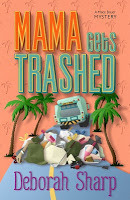
First, I must
recognize Mystery Writing is Murder as the fantastic resource it is for me, and
for countless others. Much thanks to Elizabeth for her fantastic blog, and for
inviting me to guest post today.
This month marks the
publication of the
fifth book in my Mace Bauer Mystery Series. It seems a good time to pause
to look back at what I didn't know when I started out. Here are 5 Things About Book Publishing I Wish I Knew Then:
1. Writing your first book isn't the hard part.
The other stuff --
getting it published, promoting it, learning the ins and outs of marketing when
your entire experience in sales was peddling Girl Scout cookies in the fifth
grade --- that's the hard part. And if you're doing a series, like me, you'll also
be writing another book during the learning curve. Start learning about the
business side of being a writer before you get published.
2. Your readers are not only drawn TO your setting,
they're drawn FROM your setting.
Give this some
thought. Had I done so at the beginning, I might not have set my first book,
and hence my series, in a region of Florida that has more cattle than people.
Cows, in case you didn't know, do not buy books.
3. Publishers
want what they want when they want it.
When I began working
on my switch from journalism to fiction-writing in 2004, ebooks weren't even a
gleam in Amazon's eye. I went the traditional publishing route. If you do the
same, you'll probably wait months to hear from a publisher you've pitched. You
may not ever hear back at all. But if you do, and turn in the finished version
of your manuscript, months may pass without a word. Then, suddenly, they'll get
back to you with a cover design, or a request for changes, and it'll be, SNAP
TO IT! As a former news reporter, I viewed that distant deadline as a
long, luxurious stretch of time. Now I know how time accelerates quickly toward
the end of the process. Understand that publishers do not like to be kept
waiting.
4. When you
decide to don something "fun" or "quirky" because it's
something your character might wear, readers will expect to see you in it. ALL
THE TIME.
''Where's Mama's
veil?''
I still hear that
question, three years after I dressed in hideously tacky wedding attire to
promote Book No. 3, ''Mama Gets Hitched.'' Not only did I get a permanent
neck crick from plopping five pounds of pearls, ribbons, and tulle on my head,
the wedding hat became a hard act to follow. Sure, a feather boa and diva
sunglasses worked for the movie theme of No. 4, ''Mama Sees Stars.'' But what
am I supposed to do for No. 5, ''Mama
Gets Trashed?'' That book opens in the city dump. Must I dress in a Hefty
bag, and dip up punch from a trash can? Be careful with costumes!
5. The quality
of your first book is key to the success of your series. Fortunately, I
had lots of time -- and a fantastic critique group -- to polish and improve my
first title. I only realized later most series readers start at No. 1, no
matter which book the author may be promoting. That one establishes the characters
and the foundation for everything that follows. If No. 1 is a sloppy rush job,
readers won't pick up No. 2. All aspiring writers hear this advice.
Listen, because it's absolutely true: Write the best book you can, right out of
the gate.
One lesson I'm
struggling with now is how real life can intrude on our writing lives.
I write a funny
mystery series. When sad things happen, it's hard to be funny. Within the span
of a year, my mother's failing health and dementia forced me to place her in
assisted living. I had to sell the house where Mom -- my muse! -- lived for 65
years; the house where I was raised. Meanwhile, my husband's mother was dying
of cancer. We were at her bedside when she passed away. Nothing funny about any
of that.
I decided to take a
break from writing the series. My editor at Midnight Ink has been kind enough
to leave the door open should Mace, Mama, and the gang from Himmarshee, Fla., want to
come back. I've had some time lately to slow down, so I've been thinking of
things I wish I knew back when.
How about you? What
lessons have you learned along the way that you wish you'd known at the start?

Florida native Deborah Sharp
is the author of the funny, southern-flavored Mace Bauer Mysteries, featuring Mace's wacky mama. She
lives with husband Kerry Sanders in Fort Lauderdale, where she spends her time chasing
the iguanas out of her hibiscus.
Published on September 10, 2013 21:01
September 8, 2013
Primary Sources
By Elizabeth S. Craig, @elizabethscraig

Last December I was at a Christmas
drop-in and was hanging out near the back of the room…my favorite haunt at
social events. This spot is even better
if there is wine near the back of the room, which was the case for this party.
I’m sure I’m the despair of many a poor
hostess, but this one was doing a great job trying to engage me. “Let me introduce you
to my friend," she said. She brought me over to a
gentleman who was also standing in the back of a room, this one the
kitchen. “Elizabeth is a mystery
writer,” she said with a smile. Of
course I winced at being outed as a writer—you just never know how that’s going
to go. And the hostess continued, “Elizabeth, my friend is a botanist.”
I lit up.
The party flew by and I wasn’t the first person to leave this
time—perhaps not even the fourth or fifth person. I’d immediately gasped as if
I’d met a rock star and said, “So you must know all about poisons!” He did.
The poor man.
It was a good thing that no one else
found the botanist as fascinating as I did.
I completely monopolized him as I avidly picked his brain on North
Carolina poisons, emailing myself the information on my phone. My husband gave up trying to be part of our
conversation as I recorded poison after poison in complete delight. It was my
most favorite party ever. And—I got lots of information on Destroying Angel, a
type of mushroom that I’m using in my next book.
This made me realize that, introverted as
I am and as fond of computer research as I am—sometimes nothing beats primary
sources. The botanist loved talking about poisons and had ideas for
many different types. I could
immediately learn if they’d work for my story by asking how long before they
took effect, if they had a bitter taste that would prevent the victim from
continuing to eat/drink the item, etc.
I’ve also used primary sources to fill in
bits of research that would take forever for me to research online. Last year, I asked a successful barbeque
competitor how teams were set up for the Memphis in May barbeque competition
and what it took to win. I’ve asked cops
police procedural questions, particularly how they relate to small towns. And I’ve asked a former participant in beauty
contests exactly how one contestant could take revenge on another and ruin
their chances…and if these contests got that competitive (they can and do,
apparently).
Aside from the botanist, I’m usually
fairly organized when I contact a primary source. If I’m calling, I immediately explain that
I’m a writer (especially when I ask police officers murder-related questions!),
ask if there’s a good time to call them back or if they’re currently available,
and always make sure I have my list of questions in front of me. Email sometimes is a better way to
communicate with sources because then you’ve got it all in writing. I’m not fond of the phone, but sometimes
that’s preferred by the person I’m interviewing. And, as much as I dislike it, I probably do
get the information faster because I can ask follow-up questions right then
instead of having to email them back.
Something else I’ve found on these
occasions when I’ve talked with a primary source—I get ideas and information to
work with on other projects. Plus, it gives me extra inspiration to talk
with someone who really knows the topic I’m asking them about and who’s excited
about it.
I credit my source in my acknowledgments
and send them a signed book when it releases.
Have you ever used primary sources for
researching a book?
Image: Destroying Angel, Wikimedia Commons, Calvero
Published on September 08, 2013 21:01
September 7, 2013
Twitterific
By Elizabeth S. Craig, @elizabethscraig

Twitterific
links are fed into the Writer’s
Knowledge Base search engine (developed by
writer and software engineer Mike Fleming) which has over 23,000 free articles
on writing related topics. It's the search engine for writers.
Sign up for our free newsletter for bimonthly writing tips and interviews with top
contributors to the WKB or like us on Facebook.
Mike Fleming and writing coach James Scott Bell are
offering an online, interactive, writing program to help make your next novel
great. It's called "Knockout Novel" and you can learn more about it
at Knockout Novel.com.
A writer's
experiences with audiobooks (ACX) for her self-pubbed works: http://dld.bz/cPcjq and http://dld.bz/cPcjr @authorterryo
Conflicting story goals: http://dld.bz/cPcrB @JulieMusil
How to Write a Self-Help Book: http://dld.bz/cPdd8 @CormackCarr
Is the Dust-Up Over Kobo’s Devices Fair? http://dld.bz/cPeNJ @Porter_Anderson @JDGsaid
@DennisAbrams2
Authors who were able to successfully
cross over to writing mysteries: http://dld.bz/cPhvN
@mkinberg
Agatha Christie sleuth Poirot to return
in new novel: http://dld.bz/cPhM3 @timesmarts
A community for screenwriters offering
resources for screenwriters and fiction writers in other media: http://dld.bz/cPjwJ @theBlackBoard
A free directory of cover designers,
formatters, freelance editors, and more: http://bit.ly/nolbXq
7 Habits of Highly Successful Writers: http://dld.bz/cNTnx @paperblanks
How to Become a Novelist in Your Second
Career: http://dld.bz/cNTp3 @NancyCollamer
@RLTVLive
How to Finish Your Novel (While Life Goes
On): http://dld.bz/cNTtf @aliventures
Clothing Your Characters: http://dld.bz/cNTtn @writerunboxed
The Hidden Psychological Benefits of a
Standing Desk: http://dld.bz/cNTty
@lifehacker
An Important Technique for Adding
Momentum to a Slow Plot: http://dld.bz/cNTt3
@jodyhedlund
Failure and Writing: http://dld.bz/cNTtB @mabelsblog
Top 5 Misunderstood Monsters in
Literature: http://dld.bz/cNTtC @paperblanks
7 Reasons Every Writer Needs to Be on
Twitter: http://dld.bz/cNTtJ @KristenLambTX
Writing in Bed: The Peculiar Perks of
Being Ill: http://dld.bz/cNT4X @maryawasmuth
Brain Power: What Makes A Superhero? http://dld.bz/cNT5e @tordotcom
One Book, One Year: In Praise of Reading
Slowly: http://dld.bz/cNT5m @WallaceYovetich
Flash Memoir: http://dld.bz/cNT5x
The New Face of Book Pirates:
Plagiarists: http://dld.bz/cNT55 @jamigold
3 Threats to Effective Time Blocking and
How To Solve Them: http://dld.bz/cNT5G
@ProductiveSd
Standard Pages for A Fiction Website: http://dld.bz/cNTWZ @authormedia
4 simple tips to know before you write
your first book: http://dld.bz/cNTXp
@emilypfreeman
Grid Lets You Organize Your Ideas
Visually: http://dld.bz/cNTX3 @mediabistro
10 Ways to Know You've Found Your Voice: http://dld.bz/cNTX9
Using your craft to enact revenge: http://dld.bz/cNTXU @AKellyAnderson @pshares
5 Things You Shouldn't Say to Authors: http://dld.bz/cNTY4 @brandontietz
About "multiple" or
"simultaneous" submissions: http://dld.bz/cNTYD
@DaphneUn
Positives & Negatives of Getting an
MFA (or BFA): http://dld.bz/cNV9V
@jchenwriter
7 Ways to Build Your Writing Confidence: http://dld.bz/cNVAA @KMWeiland
Journalists declare war…on ellipses: http://dld.bz/cNVAH @Poynter
Thoughts On Travel Writing: http://dld.bz/cNVAS @jones_alden @cogwbur
Taking A Break From Your Platform: http://dld.bz/cNVAV @danblank
The e.e. cummings Poem That Turned a
Surly Teenager Into a Grown-Up Author: http://dld.bz/cNVBh @AlexanderMaksik
"The bullies of
Goodreads": http://dld.bz/cPmMC
@NathanBransford @Porter_Anderson
A writer hears from residents of a town
she thought she'd made up: http://dld.bz/cNVB4
@nailyournovel
10 Techniques for Greater Creativity in
Writing: http://dld.bz/cNVJP @inspiredmag
Will Self's rules for writers: http://dld.bz/cNVKe @guardianbooks @wself
Lost for words: The curse of writer's
block: http://dld.bz/cNVKG
Is theater elitist? Theater blogs debate
whether 'experimental' theatre turns off 'regular' people: http://dld.bz/cNVMc
You're Where You Are Because of Who You
Are (but that ain't necessarily a bad thing): http://dld.bz/cNVMw
The Mother of All Query Letters: http://dld.bz/cNVMR @speechwriterguy
Rewrite Your Way to Greatness: http://dld.bz/cNXVE @alering
The Tao of the three drafts: http://dld.bz/cNXVK
Romance, gender, and the measure of a
'real book': http://dld.bz/cNXVM @RomanceSoc
"My WiP is Making Me Fat"
(& Other Writerly Truths): http://dld.bz/cNXVN
@katyupperman
Series--do they help an author sell more
books? http://dld.bz/cNXVR @rebeccaberto
How not to be eaten by sharks as a
writer: http://dld.bz/cNXWh @SusanKayeQuinn
When Not to Give an Interesting Character
a POV: http://dld.bz/cNXWn @kmweiland
How to Write Description Through
Character: http://dld.bz/cNXWp @ava_jae
The Reading Checklist for Authors: http://dld.bz/cNXWy @YAmuses
Top 7 Reasons You Should Give Your Book
Away For Free: http://dld.bz/cNXWB
@ADDerWORLD @joebunting
For The Writers: It's Just Books: http://dld.bz/cNXWC @LASbauer
Writing for today's ADD Audience: http://dld.bz/cNXWJ
On overusing exclamation points: http://dld.bz/cNXWM @GraemeIng
Tips for keeping your reader awake: http://dld.bz/cNXWP @KarenKellyBoyce
9 Reasons to Keep A Reading Journal: http://dld.bz/cN5FU @DollyGarland
8 Practical Tips for a Better
Relationship with a Writer: http://dld.bz/cN7ZM
@_mohul
This Is Your Writing On Drugs: http://dld.bz/cNReK @kenyonreview
A Revision Check List: http://dld.bz/cNYEW @WriterlyTweets
A Study in Sherlock--Finding a Character
Through Deduction: http://dld.bz/cNYFa
@YAmuses @KALongshore
Screenwriting: 7 Ways Film Training Can
Ruin Your Career: http://dld.bz/cNYFk
@Raindance @fredericabyron
How Not To Begin A Story: http://dld.bz/cNYFC @woodwardkaren
Building a better Batcave (comfortable
writing environment): http://dld.bz/cNYFQ
@eThrillerWriter
30 Things to Tell A Book Snob: http://dld.bz/cNYFU @matthaig1
Character building tips: http://dld.bz/cNYFV @eThrillerWriter
Three Dimensional Characters: http://dld.bz/cNYFW @TaliaVance @YAmuses
10 Dead Simple Ways To Make Readers Love
Your Characters: http://dld.bz/cNYGf
@ScreenwritingST @scriptgods
The Shy Writer's Cocktail Party Survival
Guide: http://dld.bz/cNZ8Z @AnneGBrown
"750 Words" Helps You Meet
Daily Writing Goals: http://dld.bz/cNZ9q
@jasonboog
Top Free & Paid Services to Promote
Your Kindle Books: http://dld.bz/cNZ9w
Inspiration is a Fickle Mistress: How to
write sustainably: http://dld.bz/cNZ9W
@ReadDanLevinson
The 7 Personalities Every Successful Film
Crowdfunder Has: http://dld.bz/cNZAg
@elliot_grove @raindance
Searching for Your Character's Root Need:
http://dld.bz/cNZAm @YAMuses @rossibooks
Why it's difficult to get into the
manga/comic business: http://dld.bz/cNZAs
@DavidCampitiGHG
Editing tips: http://dld.bz/cNZAv
For coffee-addicted writers: What
Caffeine Really Does to Your Brain: http://dld.bz/cNZAy
@PsyBlog
Use Google as a Timer with a Simple
Search Command: http://dld.bz/cNZAD @kingthor
3 Rules to Write World-Changing Memoir: http://dld.bz/cNZAH @jeffgoins
3 conversations about writing: http://dld.bz/cNZAX @afesmith
Authors on the Importance of Writing the
Final Chapter First: http://dld.bz/cParP
@flavorwire
Why We Hate & Love The Cheaters Who
Lie: http://dld.bz/cParT
1 simple secret for success for a writer:
http://dld.bz/cPase @ChadRAllen
6 reasons why you need to write more
books: http://dld.bz/cPash @Brooklyn__Ann
Writers and the
advice culture: http://dld.bz/cPnCs
@jaelmchenry @Porter_Anderson @hughhowey
How to Get Your Screenplay Read Without
Asking: http://dld.bz/cPasv @jeannevb
@scriptmag
Letting your characters go: http://dld.bz/cPas8 @writerunboxed
What is means when you hear your
"tone is wrong": http://dld.bz/cPasM
@io9
10 Traits of a Strong Antagonist: http://dld.bz/cPasR @janice_hardy
Promoting a Poetry Collection: http://dld.bz/cPatm @robertleebrewer
10 OneNote Features that Will Rock Your
Writing World: http://dld.bz/cPatt
@JennyHansenCA
Is Perfectionism Killing Your Career? http://dld.bz/cPa2V @KristenLambTX
50 Productivity Tricks: http://dld.bz/cPa2Z @lifehackorg
Gender and the Gothic Space: http://dld.bz/cPa3E @GothImagination
The Millennial Method Of Publishing?
Do-It-Yourself: http://dld.bz/cPa3F
@ShereneJoseph @Forbes
Want to Make Your Writing Life Joyful?
Stop Counting: http://dld.bz/cPa3G
Dreams and Bestsellers: http://dld.bz/cPa3K @kristinerusch
Contrasting personality traits: http://dld.bz/cPbDn @glencstrathy
Recording things: Snippets of dialogue: http://dld.bz/cPbDq @Le_Shack
MYTH #1--There is only 1 right way to do
anything in publishing: http://dld.bz/cPbD2
@deanwesleysmith
Regulating Our Emotions To Be More
Creative: http://dld.bz/cPbDD @DouglasEby
@PsychCentral
Commonly Confused Words: http://dld.bz/cPbDG @janetboyer
Physical Attributes Entry: Underweight: http://dld.bz/cPbDK @beccapuglisi
Best Online Backup Services: http://dld.bz/cPbDZ @lifehacker
Audience Development for Writers: Your
Life-Long Career Investment: http://dld.bz/cPbEd
@janefriedman
3 Ways Marketing Fiction Differs from
Marketing Nonfiction: http://dld.bz/cPbEe
@thecreativepenn
Authors and Reading Communities: http://dld.bz/cPbEn @author_sullivan
"Everything I Know About Writing Sci
Fi I Learned from Star Trek": http://dld.bz/cPbEH
@PiperBayard
5 Ways To Get The Most Out Of Your
Editing Experience: http://dld.bz/cPbFm
@BookAnalyst
The Writer's Toolbox: Must-Haves for
Today's Author, with Links to Free Downloads: http://dld.bz/cPbFw
@ruthharrisbooks
The 5-Step Mission Statement (An Author
Essential): http://dld.bz/cPbFz @duolit
A Full-time Indie Author Answers Your
Questions: http://dld.bz/cPbF4 @goblinwriter
Is it ever too late to write an outline? http://dld.bz/cPbGc @nailyournovel
Is Your Prose Too Complex? http://dld.bz/cPbGe @KMWeiland
The issue of novel length: http://dld.bz/cPbGU @lawrence_wray
How to Edit Your Own Book: Tips from
Authors on the Revision Process: http://dld.bz/cPbHc
@chrisrobley
How A Great Twitter Bio Can Net You More
Followers…and Sales: http://dld.bz/cPbHj
@badredheadmedia
Paying to promote your book? Read this: http://dld.bz/cPbRb
The Art of Writing Simply: http://dld.bz/cPbRh @Uberflip
7 Rules for Writing Short Films: http://dld.bz/cPbSc @raindance
The fine art of writing small: http://dld.bz/cPbSv
On ebook price points: http://dld.bz/cPbS3 @dearauthor
Slate Gets It Wrong – The Real Reason
Hollywood Makes Bad Movies: http://dld.bz/cPbS9
@goodinaroom
3 steps to selling more of your
nonfiction books: http://dld.bz/cPbSH
@MrBuzzFactor
71 Ways to Promote and Market Your Book: http://dld.bz/cPbSQ @writerplatform
Character Motivation and Desire Lines: http://dld.bz/cPbSX
40 Inspiring Workspaces Of The Famously
Creative: http://dld.bz/cPbTv @BuzzFeedDIY
Book Marketing: The Long Term Launch: http://dld.bz/cPbTz @CormackCarr
ISBN Essentials: An FAQ for eBook
Publishers: http://dld.bz/cPbT9 @Wogahn
Be Smart not Taken: Red Flags to Heed
When Seeking Self-Publishing Providers: http://dld.bz/cPbTQ
@shewritesdotcom
The Daily Routines of 12 Famous Writers
(And How They Can Help You Succeed): http://dld.bz/cPbUm
@james_clear
7 Deadly Sins of Worldbuilding: http://dld.bz/cPbUs @io9
Spanish Gothic Horror: http://dld.bz/cPbU4 @GothImagination
"Wait, Video Games Have
Writers?" http://dld.bz/cPbUC
@HiJayPosey
What if video games didn't exist... and
we all read books instead: http://dld.bz/cPbUK
@CatGoneCrazy
Your Music Publishing Cheat Sheet: http://dld.bz/cPea8 @eshac
Tips for approaching an editor: http://dld.bz/cPeaR
Writer's Block: On The Persistence of
Demons: http://dld.bz/cPeaZ @BTMargins
Must We Like the Characters? http://dld.bz/cPeba @junglereds
Top 12 Quotes On Writing Memoirs: http://dld.bz/cPeRt @Writers_Write
10 tips to help you avoid telling
writing: http://dld.bz/cPeR8 @Scribendi_Inc
Writing People of Color in NA Fiction: http://dld.bz/cPeSX @NAAlleyBlog
How to Develop Good Writing Habits: http://dld.bz/cPeTj @cloutpower
Published on September 07, 2013 21:01
September 5, 2013
Helpful Links for Writers
By Elizabeth S. Craig, @elizabethscraig

I wanted to share some sites that I’ve
found really helpful lately. I’m always
looking for ways to save time using apps and, so frequently, I seem to end up
with exactly the opposite—sites that take too long to set up, are unwieldy, or
that are total time sucks.
But these sites get special recognition
from me today because they’ve helped me out. I’m in favor of anything that
saves me even a few minutes of time. These sites are all free.
For
marketing: http://authormarketingclub.com/
I realize I might be the last kid on the
block to find out about this site. But I somehow stumbled into it recently and
it’s been very useful. Useful, as in “I’ve made more money in sales from
something that’s free.” I’m not doing
the premium membership (yes, I’m cheap), but the free membership has had
several cool features that I’ve found helpful.
One is a link that links to a
ton of places to list your free book promo on Kindle. I’ve never, ever used these. I hear about
Pixel of Ink and these types of sites and I nod that it’s a terrific idea. I
never use them. This time, I pulled up
my book’s Amazon link, pulled up my website link, pasted my ISBN/ASIN onto a
Notepad doc (this is handy to have around since several sites wanted them), and
I started listing my free book on various sites. I spent 15 minutes. I noticed a significant increase in sales in
a short period of time, so I’m assuming these sites had something to do with
it.
There’s also a handy book widget creation
tool. I was pretty impressed.
For
organizing information: I’ve mentioned
before that I use the free version of Evernote
to organize information. It’s sort of
like an online file cabinet with different notebooks inside. You can use it to
store pictures and text, or email files directly to the app. You can also sync
it to your phone if you want access to your files on the go (which I do.
Particularly at the grocery store when I can’t remember the ingredients for the
supper I’m planning. All my favorite
recipes are on Evernote.
But somehow, I never got the hang of the Evernote web clipper. I’d installed it once, then forgot it was
there and never used it. Then I read
this Lifehacker article by Whitson Gordon recently on Evernote (I've Been Using Evernote All Wrong. Here's Why It's
Actually Amazing) and how to get better use out of it. It mentioned the web clipper. Let’s just say that I’m a fan. If there’s a writing-related post that’s
helpful, for instance, I just click on the little web clipper icon that’s in my
toolbar and it clips the body of the article, skipping the header, footer,
margins, etc. I can even add notes to the clipping in the pop-up window. It’s handy and easy. I’ve got many notebooks in my
Evernote—everything from recipes to settings to writing tips. What I like most is the way I can search
Evernote easily for exactly what I need.
Curation:
All right, I know this won’t apply to everyone.
But I think that Prismatic is a very cool site. If you’re not a content curator, you could
use Prismatic to discover new blogs to follow.
I discovered the site while reading an
article by Steve Young for Social Media Examiner: How
to Find Great Content to Share on Twitter.
I’m actually in the position of having tons of content to share on Twitter. I’m currently following over 2700 blogs in my
Feedly reader.
But I’ve found that sometimes either I feel like the material I’m seeing
is a little stale—or maybe it’s just that I’m
a little stale after reading through so much content. When SME recommended Prismatic, I decided to
give it a go. Through them, I’ve
discovered new blogs to follow…blogs with different points of view and
different types of writing-related content.
It’s made me a bit more interested in posting links, simply because I’m
looking at new material. This can be a
time suck because there are so many cool blogs to discover…you might want to
set yourself a timer if you head over there.
Time
Management: And one last word…on the subject of timers,
actually. I’ve used Online
Stopwatch for years (free, of
course), but recently saw an article on Lifehacker (yes, Lifehacker once again)
by Thorin Klosowski: Use Google as a Timer with a Simple
Search Command. Yes, that’s all it takes. Type in “set timer for 30 minutes”—or however
many minutes—and you’ve got an instant timer.
Obviously handy for a phone, too.
That’s all for me today. Have you got any cool sites or apps to share?

I wanted to share some sites that I’ve
found really helpful lately. I’m always
looking for ways to save time using apps and, so frequently, I seem to end up
with exactly the opposite—sites that take too long to set up, are unwieldy, or
that are total time sucks.
But these sites get special recognition
from me today because they’ve helped me out. I’m in favor of anything that
saves me even a few minutes of time. These sites are all free.
For
marketing: http://authormarketingclub.com/
I realize I might be the last kid on the
block to find out about this site. But I somehow stumbled into it recently and
it’s been very useful. Useful, as in “I’ve made more money in sales from
something that’s free.” I’m not doing
the premium membership (yes, I’m cheap), but the free membership has had
several cool features that I’ve found helpful.
One is a link that links to a
ton of places to list your free book promo on Kindle. I’ve never, ever used these. I hear about
Pixel of Ink and these types of sites and I nod that it’s a terrific idea. I
never use them. This time, I pulled up
my book’s Amazon link, pulled up my website link, pasted my ISBN/ASIN onto a
Notepad doc (this is handy to have around since several sites wanted them), and
I started listing my free book on various sites. I spent 15 minutes. I noticed a significant increase in sales in
a short period of time, so I’m assuming these sites had something to do with
it.
There’s also a handy book widget creation
tool. I was pretty impressed.
For
organizing information: I’ve mentioned
before that I use the free version of Evernote
to organize information. It’s sort of
like an online file cabinet with different notebooks inside. You can use it to
store pictures and text, or email files directly to the app. You can also sync
it to your phone if you want access to your files on the go (which I do.
Particularly at the grocery store when I can’t remember the ingredients for the
supper I’m planning. All my favorite
recipes are on Evernote.
But somehow, I never got the hang of the Evernote web clipper. I’d installed it once, then forgot it was
there and never used it. Then I read
this Lifehacker article by Whitson Gordon recently on Evernote (I've Been Using Evernote All Wrong. Here's Why It's
Actually Amazing) and how to get better use out of it. It mentioned the web clipper. Let’s just say that I’m a fan. If there’s a writing-related post that’s
helpful, for instance, I just click on the little web clipper icon that’s in my
toolbar and it clips the body of the article, skipping the header, footer,
margins, etc. I can even add notes to the clipping in the pop-up window. It’s handy and easy. I’ve got many notebooks in my
Evernote—everything from recipes to settings to writing tips. What I like most is the way I can search
Evernote easily for exactly what I need.
Curation:
All right, I know this won’t apply to everyone.
But I think that Prismatic is a very cool site. If you’re not a content curator, you could
use Prismatic to discover new blogs to follow.
I discovered the site while reading an
article by Steve Young for Social Media Examiner: How
to Find Great Content to Share on Twitter.
I’m actually in the position of having tons of content to share on Twitter. I’m currently following over 2700 blogs in my
Feedly reader.
But I’ve found that sometimes either I feel like the material I’m seeing
is a little stale—or maybe it’s just that I’m
a little stale after reading through so much content. When SME recommended Prismatic, I decided to
give it a go. Through them, I’ve
discovered new blogs to follow…blogs with different points of view and
different types of writing-related content.
It’s made me a bit more interested in posting links, simply because I’m
looking at new material. This can be a
time suck because there are so many cool blogs to discover…you might want to
set yourself a timer if you head over there.
Time
Management: And one last word…on the subject of timers,
actually. I’ve used Online
Stopwatch for years (free, of
course), but recently saw an article on Lifehacker (yes, Lifehacker once again)
by Thorin Klosowski: Use Google as a Timer with a Simple
Search Command. Yes, that’s all it takes. Type in “set timer for 30 minutes”—or however
many minutes—and you’ve got an instant timer.
Obviously handy for a phone, too.
That’s all for me today. Have you got any cool sites or apps to share?
Published on September 05, 2013 21:01
September 3, 2013
Thoughts on Teaser Chapters
By Elizabeth S. Craig, @elizabethscraig
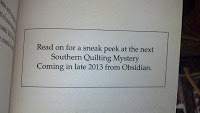
I had a deadline Sunday that I met just
in the nick of time. :) It was a
deadline for a teaser chapter—the first chapter in my current WIP that will go
into the back of the December Penguin release.
I realized that I treat teaser chapters
differently, depending on the situation.
I actually sweated a bit over this one, which was probably why I ran so
close to deadline. That’s because my
editor asked for this chapter (with a September 1 deadline) before I actually started writing the book or
even the outline. That means that I
wrote the chapter with an eye for marketing.
I was particularly conscious of the
opening hook and the chapter ending. Ordinarily…I really don’t think too much
about them. I always open with dialogue,
even though I keep reading that this is a “bad thing.” It’s worked out all
right for me.
It's certainly easier on me when I get the request for a teaser chapter and I can lift the chapter out of an
already-completed first draft.
My publisher tells me that they want the
first chapter “fairly firm”—in other words, they don’t want any major
changes. Minor word changes would be all
right. Changing the characters’
names—not so great.
My editor will always say that if I don’t
have a solid first chapter for the teaser that they’ll use the first chapter
for the first book in the series. My gut
tells me that’s a less-successful marketing technique so I always make sure
that I’ve got the first chapter for the new book ready (even if I’ve not
written the rest of it).
On the other hand—it occurred to me that
cliffhangers in trad-published teasers aren’t necessarily a great thing. Yes, it can pique
reader interest in the next book. But,
if the next book isn’t being released for nearly a year (as in this case), then
it might prompt some reader frustration, too.
But if you’re self-publishing, this might be exactly the effect you’re looking
for. Maybe you’ve even got the next
release in your series ready to go. Perhaps these are even backlist books. In
that case, a cliffhanger of a teaser chapter would be smart marketing.
And then…part of me wonders if teaser
chapters make a huge difference to readers at all. For me, I’m already committed to
reading the next book in a series, if I’ve enjoyed the series so far. What I have
done, as a reader, is buy someone else’s
book when a book has been cross-promoted by a publisher with a teaser
chapter. This makes me think the
self-publishing practice of trading teasers with other authors is a
smart move.
As a writer, do you use teaser
chapters? As a reader, do they have an
impact on your buying habits?
Published on September 03, 2013 21:01
September 1, 2013
Help With Dialogue Tags
Guest Post by Jack Smith
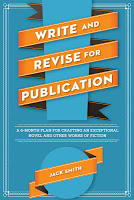
Dialogue
Tags
What about “he said”/”she said”—do you
need them? Or perhaps the character’s
name instead of the pronoun? How much of
either is needed? How much is too
much? Like everything else in creative
writing, no rules here. Only what
works. And you can think of this matter
in at least two ways: clarity and style—or both.
Take a look at this passage from Raymond
Carver’s “What’s in Alaska?” Do we need
the dialogue tags?
“I don’t know. Something Mary said,” Helen said.
“What did I say?” Mary
said.
“I can’t remember,”
Helen said.
“We have to go,” Jack
said.
“So long,” Carl
said. “Take it easy.”
We could probably use some help here,
clarity-wise, since we’ve got four characters speaking, but notice too that
Carver creates an interesting cadence by the repetition of “said.” Really!
Nice, isn’t it? What if he went
by some silly hard-and-fast rule about cutting down your use of “said.” We would miss the lyrical quality of his
prose. Wouldn’t we?
Is clarity a matter in this passage from
Carver’s “The Compartment”?
They love you, I said.
No, they don’t, he
said.
I said, Someday,
they’ll understand things.
Maybe Wes, said. But it won’t matter then.
You don’t know, I
said.
I know a few things,
Wes said, and he looked at me.
Clarity is much less an issue here. But again—notice how the repetitive use of
“said” builds an interesting cadence. The texture of the prose draws us in—or
at least it draws me in.
Notice now this passage from Hemingway’s The Sun Also Rises. No dialogue tags:
“He must drink a lot
of wine.”
“Or wear purple
undershirts.”
“Let’s ask him.”
“No. He’s too tired.”
There’s plenty of this bare-bones
dialogue in this novel. And by now, this
stripped-down dialogue is pretty familiar to many readers—readers, for
instance, of Cormac McCarthy. It creates
an impact. We hear conversation spoken,
and that’s it—like an audio tape.
But there’s a middle road—a “he said,” a “she
said,” or “Norm said,” or “Mary said,” now and then—and then an action line
that establishes who’s talking. For
instance, also from The Sun Also Rises:
“Poor old
darling.” She stroked my head.
You could avoid the tags by action lines
like this. We know who’s talking.
So what are your options?
1.
Ramp up the dialogue tags.
2. Eliminate them altogether and go with
the bare-bones back and forth exchange.
3. Insert action lines now and then to
find ways to avoid tags.
But don’t get the idea that it’s best to
go for the Aristotelian Mean and take a middle path. Think clarity, but also think style.
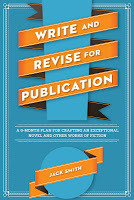 What sound do you want to create? What tone?
What sound do you want to create? What tone? Jack Smith
Write and Revise for Publication
, Writer’s Digest, 2013, and Hog to Hog, winner of the George
Garrett Fiction Prize, Texas Review Press, 2008
Published on September 01, 2013 21:01



